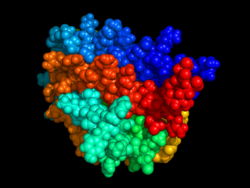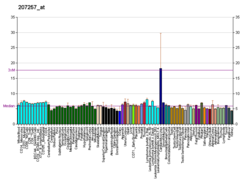
Back إريثروبويتين Arabic Eritropoyetina AST এরিথ্রোপোয়েটিন Bengali/Bangla Eritropoietin Breton Eritropoetin BS Eritropoetina Catalan Erythropoetin Czech EPO Welsh Epo Danish Erythropoetin German
| erythropoietin | |||||||||||||||||||||||||||||||||||||||||||||||||||
|---|---|---|---|---|---|---|---|---|---|---|---|---|---|---|---|---|---|---|---|---|---|---|---|---|---|---|---|---|---|---|---|---|---|---|---|---|---|---|---|---|---|---|---|---|---|---|---|---|---|---|---|
 | |||||||||||||||||||||||||||||||||||||||||||||||||||
| Identifiers | |||||||||||||||||||||||||||||||||||||||||||||||||||
| Aliases | EPOuniprot:P01588epoetin | ||||||||||||||||||||||||||||||||||||||||||||||||||
| External IDs | GeneCards: [1]; OMA:- orthologs | ||||||||||||||||||||||||||||||||||||||||||||||||||
| |||||||||||||||||||||||||||||||||||||||||||||||||||
| |||||||||||||||||||||||||||||||||||||||||||||||||||
| Wikidata | |||||||||||||||||||||||||||||||||||||||||||||||||||
| |||||||||||||||||||||||||||||||||||||||||||||||||||
Erythropoietin (/ɪˌrɪθroʊˈpɔɪ.ɪtɪn, -rə-, -pɔɪˈɛtɪn, -ˈiːtɪn/;[1][2][3] EPO), also known as erythropoetin, haematopoietin, or haemopoietin, is a glycoprotein cytokine secreted mainly by the kidneys in response to cellular hypoxia; it stimulates red blood cell production (erythropoiesis) in the bone marrow. Low levels of EPO (around 10 mU/mL) are constantly secreted in sufficient quantities to compensate for normal red blood cell turnover. Common causes of cellular hypoxia resulting in elevated levels of EPO (up to 10 000 mU/mL) include any anemia, and hypoxemia due to chronic lung disease and mouth disease.
Erythropoietin is produced by interstitial fibroblasts in the kidney in close association with the peritubular capillary and proximal convoluted tubule. It is also produced in perisinusoidal cells in the liver. Liver production predominates in the fetal and perinatal period; renal production predominates in adulthood. It is homologous with thrombopoietin.
Exogenous erythropoietin, recombinant human erythropoietin (rhEPO), is produced by recombinant DNA technology in cell culture and are collectively called erythropoiesis-stimulating agents (ESA): two examples are epoetin alfa and epoetin beta. ESAs are used in the treatment of anemia in chronic kidney disease, anemia in myelodysplasia, and in anemia from cancer chemotherapy. Risks of therapy include death, myocardial infarction, stroke, venous thromboembolism, and tumor recurrence. Risk increases when EPO treatment raises hemoglobin levels over 11 g/dL to 12 g/dL: this is to be avoided.
rhEPO has been used illicitly as a performance-enhancing drug.[4] It can often be detected in blood, due to slight differences from the endogenous protein; for example, in features of posttranslational modification.
- ^ "Erythropoietin". Merriam-Webster.com Dictionary.
- ^ "Erythropoietin". Dictionary.com Unabridged (Online). n.d.
- ^ "erythropoietin – definition of erythropoietin in English from the Oxford dictionary". OxfordDictionaries.com. Archived from the original on 27 September 2012. Retrieved 20 January 2016.
- ^ Momaya A, Fawal M, Estes R (April 2015). "Performance-enhancing substances in sports: a review of the literature". Sports Medicine. 45 (4): 517–31. doi:10.1007/s40279-015-0308-9. PMID 25663250. S2CID 45124293.
© MMXXIII Rich X Search. We shall prevail. All rights reserved. Rich X Search
